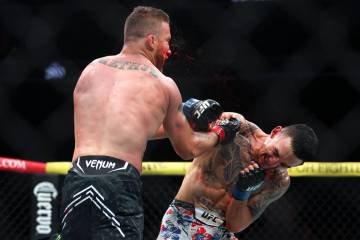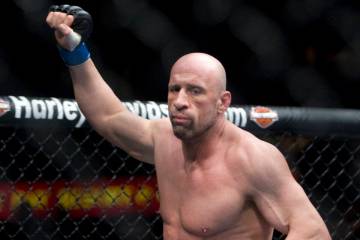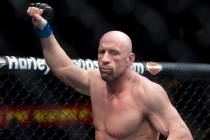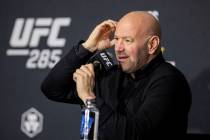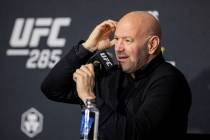UFC rises from obscurity to become a smash hit
Dana White has told the story many times.
It was one of his first news conferences as president of the Ultimate Fighting Championship, and only three members of the media had gathered in New York to hear White and two fighters, Tito Ortiz and Evan Tanner, hype the organization's forthcoming card in Atlantic City.
Two reporters were Hispanic and one was from a fledgling mixed martial arts Web site.
"The guy from the Web site asked a question and it was answered," White said. "Then one of the other reporters asked Tito a question in Spanish and Tito says, 'I don't speak Spanish.' The two Hispanic reporters got up and left. You talk about humble beginnings."
Things certainly have changed for White and the Las Vegas-based UFC as the premier mixed martial arts organization readies itself for its historic UFC 100 card at Mandalay Bay on Saturday night.
Last Wednesday, more than 100 reporters assembled on a conference call featuring two competitors from the upcoming card.
UFC welterweight champion Georges St. Pierre, who will defend his title against Thiago Alves on Saturday, points to the increased media exposure as a catalyst for the growth of mixed martial arts and, in particular, the UFC.
"They've been following the sport more and more, and I think that's what gives us credibility. Before the sport was not mainstream. It was, for many people, like human cockfighting. It was a barbarian sport," St. Pierre said.
"Now, I think even the media, they've started following the sport, and they talk about us like real athletes, and that's what we are. We train like real professional athletes. That's our full-time job."
That acceptance did not come overnight.
White and his childhood friends, casino executives Lorenzo and Frank Fertitta, acquired the struggling UFC for just $2 million in 2001. Today, Forbes estimates it is worth about $1 billion.
At the time, the organization was such an enigma that it was banned from pay per view by most cable and satellite providers in the United States.
The rules of mixed martial arts just had been adopted, but because of a campaign launched by Sen. John McCain, R-Ariz., several years earlier, the sport was banned in nearly 40 states.
The first turning point toward the growth of the UFC came just before White and the Fertittas purchased the company.
The New Jersey State Athletic Control Board, along with help from people in the sport and other athletic commissions, including Nevada, established the Unified Rules of Mixed Martial Arts.
The rules enabled mixed martial arts to be seen as more sport and less "human cockfighting," as McCain had called the sport.
Still, many states banned the sport, and television only slowly allowed the events back on pay per view. Zuffa, the company formed by White and the Fertittas as the owner of the UFC, was hemorrhaging money.
"Lorenzo called me one day and said, 'Dude, I can't continue to burn my family's fortune on this thing. I'm blowing all my kids' money. I need you to get out there and see what you can get for this thing.' At this point, we're anywhere between $30 (million) and $40 million in the hole. I called him back and said I can get you $4 (million) for sure, maybe $6 (million). He says, 'I'll call you tomorrow,'" White said.
"I didn't sleep a wink that night. I told (our lawyer), 'I think it's over.' Lorenzo called me the next morning and said, '(Expletive) it. Let's keep it going.' I was already in overdrive, but I knew that I had to take it up a notch."
Still, White always believed the UFC could be a viable entity in the sports world.
"The only doubts I had were the timing and could we get done what we needed to get done. I knew it was an education process, and I knew we had to get on television."
He took care of both elements with one idea.
The UFC established a reality show on Spike TV called "The Ultimate Fighter." The first season produced several of the current stars of the UFC, but it was one fight in particular that is credited with pushing the organization to the next level.
Forrest Griffin fought Stephan Bonnar for the Season 1 light heavyweight title at Cox Pavilion. The bout was an instant classic. The fighters went back and forth at each other for three full rounds, with Griffin finally being declared the winner by unanimous decision.
That 2005 contest changed everything for the UFC.
The next year, in 2006, the company did an estimated $222 million in pay-per-view sales, by far the biggest year for the company up to that point.
Bonnar, who will fight Mark Coleman on the UFC 100 card, noticed a difference in the sport after the classic bout.
"It changed a lot of things. The thing I really take away from it is my whole life. I loved martial arts and nobody ever really understood where I was coming from. After that fight, it seemed like people accepted it and kind of embraced it, whereas before it was more of a spectacle. A lot of people have told me that fight kind of won them over and made them say this is a legitimate sport."
That doesn't mean the UFC is universally accepted.
New York State Assemblyman Bob Reilly has been an outspoken critic of the sport and, in particular, White. He has led opposition to regulation in his state, and mixed martial arts still is illegal in New York.
The UFC also was met by a great deal of resistance on its recent trip to Cologne, Germany. The city council there threatened to stop a planned event from taking place before eventually settling on a rule requiring all attendees to be at least 18 years of age.
The UFC's vice president for regulatory affairs, Marc Ratner, the former executive director of the Nevada Athletic Commission, thinks resistance will fade when the uninitiated gain more knowledge of the sport.
"It's always about education, still to this moment," Ratner said. "We think we're getting closer to the mainstream. As Dana always says, we haven't even scratched the surface yet. I still hear some of the same 1995 and 1996 arguments. No holds barred. Guys just get beat up and severely maimed. Guys have been killed in the ring. I have to say, 'Wait a minute. What are you talking about? That's not true. You don't know your facts.'"
A large number of people have gotten the message. Tickets to UFC 100 sold out during a presale without ever being available to the general public.
And after just three reporters showed up to that news conference eight years ago, the organization received more than 300 credential requests for Saturday's event.
Contact reporter Adam Hill at ahill @reviewjournal.com or 702-224-5509.
UFC 100 Interactive timeline, video and more
COMING UP THIS WEEK
MONDAY
• Top 10 UFC cards of all time
• Columnist Ed Graney on UFC 1 combatant Royce Gracie
TUESDAY
• Behind the scenes with UFC president Dana White
• The most influential people in UFC history
WEDNESDAY
• What does the future hold?
• Q&A with Las Vegas-based fighter Mac Danzig
• How betting is sizing up for UFC 100
THURSDAY
• The psychology of mixed martial arts
• Heavyweight champ Brock Lesnar looks ahead to his UFC 100 fight with Frank Mir
FRIDAY
• Mir discusses his showdown with Lesnar
• Columnist Doug Elfman on the celebrity popularity of the UFC
SATURDAY
• Welterweight champion Georges St. Pierre prepares to defend his title against Thiago Alves
• Graney on what to look for in UFC 100
SUNDAY, JULY 12
• Results from UFC 100 at Mandalay Bay
• Graney on the success of UFC 100








